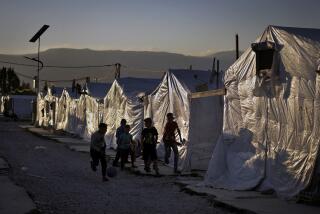Hong Kong Deports Viet ‘Boat People’ for First Time
HONG KONG — Despite strong objections from the United States, the British territory of Hong Kong early today deported to Hanoi 51 Vietnamese, most of them children, who came here seeking political asylum in the West but were later deemed to be illegal immigrants.
The expulsions marked the first time since the fall of Saigon to the Communists nearly 15 years ago that large numbers of Vietnamese have been forcibly repatriated to their homeland. They are expected to be the vanguard of tens of thousands of other Vietnamese awaiting their fate in camps and detention centers throughout Asia.
A Hong Kong government statement said no force was used in moving the 8 men, 17 women and 26 children from their quarters at 3 a.m. “They were calm. There was no incident,” a government spokesman said.
But witnesses said that as the “boat people” were being taken from the Phoenix House detention center, some of them shouted and moaned, unfurling a banner asking “Where Is Your Humanity?” There were reports that some of the refugees had locked themselves in a room at the center when police arrived and only reluctantly agreed to leave.
The 51 were taken to Hong Kong’s airport in a fleet of six trucks, where they boarded a chartered Cathay Pacific airlines Tristar jetliner for the flight to Hanoi.
They were among the first Vietnamese to have arrived here since June 16, 1988, when the government adopted a policy of screening out so-called economic migrants from political refugees in an effort to stem a tide of boat people leaving Vietnam. In the interim, nearly 44,000 people have arrived in Hong Kong seeking asylum in the West.
The deportations from Hong Kong, which the government has termed “mandatory repatriation,” are expected to be followed by similar expulsions of “boat people” by Malaysia and Thailand, which also have provided temporary asylum to Vietnamese refugees awaiting screening.
The start of the deportations provoked an outcry in Britain, where the opposition Labor Party described the move as “a wretched, discredited and shameful action.”
The London-based human rights monitoring organization Amnesty International called on the government of Prime Minister Margaret Thatcher to halt further repatriations, saying the screening procedure used to identify economic migrants is “critically flawed.”
The ultimate decision to start repatriations lay with the British government, which continues to be responsible for Hong Kong’s foreign affairs until 1997, when the territory reverts to Chinese control.
The deportations began after Hong Kong and Vietnamese officials reached final agreement on the details of the flights of returning refugees. The agreement apparently included face-saving language that met Hanoi’s objections against receiving anyone who was forced to return against his will.
The policy of forced repatriation is extremely popular in this British territory, reflecting not only the historic racial animosity between Vietnamese and Chinese but hardships for Chinese who attempt to emigrate to Hong Kong. Every year, the authorities turn back an estimated 20,000 Chinese caught entering Hong Kong illegally, including many who have relatives here.
“The boat people are threatening our security, straining the relationship between people and government,” said Ho Yin Fat, a member of Hong Kong’s Legislative Council who has led the campaign for forced repatriation. “Camps are being placed everywhere in residential neighborhoods. The people are up in arms. They are spending a lot of money on this problem.”
Ho and others have accused the United States of hypocrisy for objecting to the forced return of the Vietnamese while continuing to send home Haitians, Cubans and Central Americans seeking to improve their economic situation.
“The Vietnamese coming to Hong Kong are not running away from political ideology,” Ho said in an interview.
However, Legislative Councillor Martin Lee has publicly cautioned Hong Kong against sending the “boat people” home, recalling that after 1997 many Hong Kong residents may find themselves similarly seeking asylum in the West, and the repatriation policy could come back to haunt them.
“This is bound to have a very great adverse effect on our fight for our right of abode (in Britain) or any form of passport arrangements in the United Kingdom,” he wrote recently.
The Vietnamese refugees themselves have seized on this point. A banner raised the other day in the Whitehead detention center warned, “Hong Kong: Our Today Is Your Tomorrow.”
Leonard Davis, a professor of applied social studies at the City Polytechnic of Hong Kong, has warned that repatriation at this time will be pointless because the widespread poverty in Vietnam offers little alternative to millions of unemployed.
“If you push them back now, it will inevitably bring violence,” Davis said. “People are worried, frightened, scared. There may be a move to mass suicide. We’ve had riots and hunger strikes; what more can they do?”
Speculation about the start of repatriations has caused anxiety in the detention centers. There have been reports of hunger strikes, all-night vigils and people sleeping with their shoes on so they can try to escape if the authorities descend on them suddenly.
There has also been an upsurge of violence in the centers, apparently led by organized gangs. Corrections officials have discovered an alarming array of weaponry in the centers, and homicide is no longer uncommon. A man was killed Sunday night in the Whitehead detention center.
In all, there were 56,117 Vietnamese in refugee camps and detention centers in Hong Kong before the first flight today, including about 5,000 children under the age of 18. Of that number, 12,219 are considered refugees, meaning they arrived before June 16, 1988, or are among 703 persons not screened out. Of the remaining 43,898, almost 6,500 have either been screened out or are waiting to be screened.
After being screened out, a boat person can appeal the decision, and about 10% have had the decision overturned. Then the Office of the U.N. High Commissioner for Refugees in Geneva can declare rejected persons refugees, but it has exercised the mandate in only 32 cases so far.
“The eventual results of screening are as good as can be expected, but that’s not a 100% endorsement of the procedure,” said Raymond Hall, a spokesman for the agency.
Adrie P. Van Gelderen, refugee coordinator for International Social Service, a Geneva-based private relief group, said his organization opposes repatriation on “the principle that it is unacceptable to send people back to a place from which they’ve run.”
Van Gelderen, who has representatives in virtually all the camps, said the start of repatriation will be sure to cause riots in the camps and could backfire on British authorities if they are forced by public opinion to suspend the expulsions.
Van Gelderen said the authorities should have allowed more time for a program of voluntary repatriation to succeed. This program was also endorsed by the U.N. agency.
The voluntary program started 14 months ago, and under it only 650 people have returned to Vietnam. Another 1,000 have volunteered to go back and had been expected to do so this month, but the Vietnamese have said they are unable to keep up with the crush.
“It does not make sense to me to send back people who do not want to go back, in mandatory repatriation, when they have volunteers who are waiting to go back,” Van Gelderen said.
The U.N. agency pays the costs of the voluntary program, while the British and Hong Kong government must pay the costs of forced repatriation. Another problem is that the British have so far failed to persuade the U.N. group to monitor the forced repatriation on the Vietnamese end to ensure that returned refugees are not mistreated, as the agency has agreed to do with volunteers.
Voluntary returnees are paid $500 by the agency, while those forced back will get nothing. Britain reportedly will pay the Hanoi government $620 per person to cover resettlement costs.
Whatever the differences, British and Hong Kong officials are clearly counting on the repatriation programs to save the colony from inundation by boat people. Facilities are already under pressure.
“We’ll be in deep trouble if we’re hit by the same number of boat people next year; we’ll have enormous problems,” said Michael Hanson, Hong Kong’s refugee coordinator.
He said another 30,000 people are expected to set sail even with the program of mandatory return already in place.
The United States and other countries “need to explain what we are to do with these people,” he added.
That was a reference to the slow pace at which Western countries, including the United States, have been accepting people who successfully qualify as refugees.
Although resettlement is guaranteed, no quotas have been established. The United States disdains many of the refugees in Hong Kong because they come from northern Vietnam, where people have lived with the Communist system since the early 1950s and face little likelihood of political persecution.
Of the 12,219 political refugees in the resettlement camps here, most of whom arrived before the 1988 deadline and were thus automatically declared eligible for resettlement, more than 2,000 have been waiting more than seven years.
Dang Xuan Thuy, 17, came to Hong Kong two years ago, thus qualifying for resettlement, but he is still waiting to be given papers. He now sits in the Sham Shui Po refugee camp, smoking cigarettes and dreaming about America.
“When I left, my father said the future of Vietnam was no good,” he said through an interpreter. “I came to Hong Kong on a chance.”
More to Read
Sign up for Essential California
The most important California stories and recommendations in your inbox every morning.
You may occasionally receive promotional content from the Los Angeles Times.










